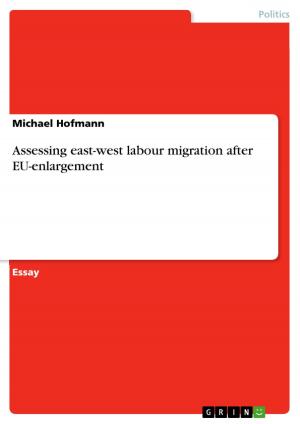The substance behind the rhetoric of a 'Europe of the Regions' and the main impediments to the establishment of an EU-wide system of regional governance?
Nonfiction, Social & Cultural Studies, Political Science| Author: | Stephan Ester | ISBN: | 9783640253531 |
| Publisher: | GRIN Publishing | Publication: | January 27, 2009 |
| Imprint: | GRIN Publishing | Language: | English |
| Author: | Stephan Ester |
| ISBN: | 9783640253531 |
| Publisher: | GRIN Publishing |
| Publication: | January 27, 2009 |
| Imprint: | GRIN Publishing |
| Language: | English |
Essay from the year 2006 in the subject Politics - International Politics - Topic: European Union, grade: 74, Swansea University, course: After Democracy: The EU and the Governance of Europe, 9 entries in the bibliography, language: English, abstract: The term 'Europe of the Regions' has been used over the last decades either to describe one of the supposed effects of the integration process on European governance or as a normative goal in the sense of a post-national Europe. Proponents of a Europe of the Regions assume that the combined effect of European integration at the top and regional decentralisation at the bottom will eventually lead to a dissolving of the traditional nation state in Europe. Others reject this view and see this development rather as the emergence of a new form of multilevel governance within the existing framework of national and European institutions. The regional element of the EU can be retraced to the establishment of the European Regional Development Fund (ERDF) in 1975 but, as Harvie points out, since that time regional development has taken a dynamic of its own which challenges the traditional nation state: 'Regionalisation, the chopping-up of problems into manageable areas, has given way to a subjective and aggressive regionalism.' Regions have doubtlessly established themselves as key players in European governance. The purpose of this essay is to clarify whether a Europe of the regions is a viable option in practice and whether it is desirable at all. To answer this question, this essay will first of all clarify the ambiguous term 'region' and analyse different concepts of regional governance in several EU countries. In a next step, it will examine the various ways of access and influence that regions can have on the EU policy process and assess the viability of these approaches. Furthermore, the role of regionalist and minority nationalist parties in promoting (or impeding) a regionalised Europe will be highlighted. Finally, the findings of this essay will be summed up to find out whether there is really substance behind the slogan of a Europe of the regions. [...]
Essay from the year 2006 in the subject Politics - International Politics - Topic: European Union, grade: 74, Swansea University, course: After Democracy: The EU and the Governance of Europe, 9 entries in the bibliography, language: English, abstract: The term 'Europe of the Regions' has been used over the last decades either to describe one of the supposed effects of the integration process on European governance or as a normative goal in the sense of a post-national Europe. Proponents of a Europe of the Regions assume that the combined effect of European integration at the top and regional decentralisation at the bottom will eventually lead to a dissolving of the traditional nation state in Europe. Others reject this view and see this development rather as the emergence of a new form of multilevel governance within the existing framework of national and European institutions. The regional element of the EU can be retraced to the establishment of the European Regional Development Fund (ERDF) in 1975 but, as Harvie points out, since that time regional development has taken a dynamic of its own which challenges the traditional nation state: 'Regionalisation, the chopping-up of problems into manageable areas, has given way to a subjective and aggressive regionalism.' Regions have doubtlessly established themselves as key players in European governance. The purpose of this essay is to clarify whether a Europe of the regions is a viable option in practice and whether it is desirable at all. To answer this question, this essay will first of all clarify the ambiguous term 'region' and analyse different concepts of regional governance in several EU countries. In a next step, it will examine the various ways of access and influence that regions can have on the EU policy process and assess the viability of these approaches. Furthermore, the role of regionalist and minority nationalist parties in promoting (or impeding) a regionalised Europe will be highlighted. Finally, the findings of this essay will be summed up to find out whether there is really substance behind the slogan of a Europe of the regions. [...]















